
Miralda and Benet Rossell, París. La Cumparsita, 1972
Museo Reina Sofía
The study group Aesthetics of Peace and Tactics of Desertion: Prefiguring New Pacifisms and Forms of Transitional Justice proposes a rethinking—through both a theoretical-critical and historical-artistic lens—of the intricate network of concepts and practices operating under the notion of pacifism. A term not without contestation and critical tension, pacifism gathers under its name a multiplicity of practices—from anti-militarism and anti-war movements to non-violence activism—while simultaneously opening urgent debates around violence, justice, reparation, and desertion. Here, pacifism is not conceived as a moral doctrine, but as an active form of ethical and political resistance capable of generating aesthetic languages and new positions of social imagination.
Through collective study, the group seeks to update critical debates surrounding the use of violence and non-violence, as well as to explore the conflict of their representation at the core of visual cultures. In a present marked by rearmament, war, genocide, and the collapse of the social contract, this group aims to equip itself with tools to, on one hand, map genealogies and aesthetics of peace—within and beyond the Spanish context—and, on the other, analyze strategies of pacification that have served to neutralize the critical power of peace struggles. Transitional and anti-punitive justice proposals will also be addressed, alongside their intersections with artistic, visual, and cinematic practices. This includes examining historical examples of tribunals and paralegal activisms initiated by artists, and projects where gestures, imaginaries, and vocabularies tied to justice, reparation, memory, and mourning are developed.
It is also crucial to note that the study programme is grounded in ongoing reflection around tactics and concepts drawn, among others, from contemporary and radical Black thought—such as flight, exodus, abolitionism, desertion, and refusal. In other words, strategies and ideas that articulate ways of withdrawing from the mandates of institutions or violent paradigms that must be abandoned or dismantled. From feminist, internationalist, and decolonial perspectives, these concepts have nourished cultural coalitions and positions whose recovery today is urgent in order to prefigure a new pacifism: generative, transformative, and radical.
Aesthetics of Peace and Tactics of Desertion, developed and led by the Museo Reina Sofía’s Studies Management, unfolds through biweekly sessions from October to June. These sessions alternate between theoretical discussions, screenings, work with artworks and archival materials from the Museo’s Collection, reading workshops, and public sessions. The group is structured around sustained methodologies of study, close reading, and collective discussion of thinkers such as Judith Butler, Elsa Dorlin, Juan Albarrán, Rita Segato, Sven Lütticken, Ruth Wilson Gilmore, and Franco “Bifo” Berardi; historical episodes such as the anti-nuclear and anti-arms race movement in Spain; and the work of artists and activists including Rojava Film Commune, Manuel Correa and the Oficina de Investigación Documental (Office for Documentary Investigation), and Jonas Staal, among other initial cases that will expand as the group progresses.
Directed by
Julia Morandeira Arrizabalaga and Lola Visglerio Gómez
Coordinated by
Elena Corrales Pérez and Ana Vidal González
Organised by
Museo Reina Sofía
Participant Selection
Particular consideration will be given to candidates whose background and interests align with the study group's contents, as well as their commitment to regular attendance in the chosen format (on-site or online).
Participation requires a biweekly time commitment of two and a half hours per session, in addition to preparation time.
Agenda
miércoles 08 oct 2025 a las 17:30
Session 1. Introduction to the study group. Rethinking pacifism today: the discomfort of peace
miércoles 22 oct 2025 a las 17:30
Session 2. Uses of (non)violence: self-defense, subjectivation and resistance
— Cross-reading of Elsa Dorlin and Judith Butler
miércoles 05 nov 2025 a las 17:30
Session 3. Aesthetics of violence and the conflict of representation I
—On the representation of victims of violence(s) in the Basque Country: three photographic projects, with Juan Albarrán
miércoles 19 nov 2025 a las 17:30
Session 4. Aesthetics of violence and the conflict of representation II
—Cross-reading of Susan Sontag, Ariel Goldberg and Yazan Khalili
miércoles 03 dic 2025 a las 17:30
Session 5. Transitional justice: artistic interventions and reparative futures I
—With Manuel Correa
miércoles 17 dic 2025 a las 17:30
Session 6. Transitional justice: artistic interventions and reparative futures II
—Archiviolítica. Methods and exoduses, with Andrés Jurado

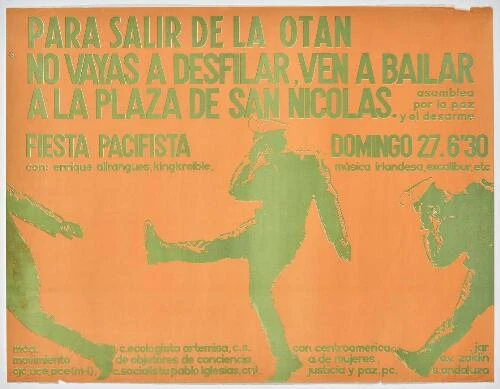
Más actividades
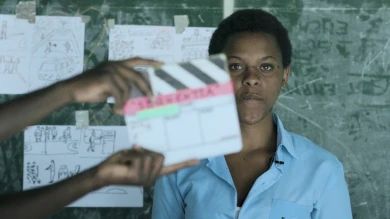
Christian Nyampeta and the École du soir
13, 14, 15 NOV, 11, 12, 13 DIC 2025
Christian Nyampeta is a Rwandan artist, musician and film-maker whose work encompasses pedagogies and community forms of knowledge production and transmission. His Ècole du soir (Evening School) is an art project conceived as a mobile space of collective learning and is named in homage to Ousmane Sembène (1923–2007), a pioneer of African cinema who defined his films as “evening classes” for the people, a medium of education and emancipation through culture.
This block is made up of three double sessions: the video work of Christian Nyampeta, the films of École du soir and one of Ousmane Sèmbene’s feature-length films. Nyampeta will introduce all three first sessions.
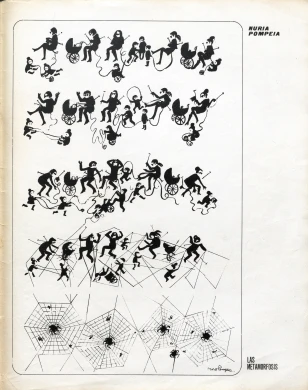
Crossed Vignettes
Friday, 21 November 2025 – Check programme
The Crossed Vignettes conference analyses the authorship of comics created by women from an intergenerational perspective and draws from the Museo Reina Sofía Collections. Across different round-table discussions, the programme features the participation of illustrators Marika, Carla Berrocal, Laura Pérez Vernetti and Bea Lema and researchers Viviane Alary, Virginie Giuliana and Elisa McCausland.
The aim of the encounter is twofold: to explore in greater depth the different forms in which women comic book artists have contributed to developing a counterculture; namely, the appearance of ruptures, reformulations and new genres within the ninth art. And to set up a dialogue which ignites an exploration of genealogies linking different generations of artists.
Moreover, the activity is put forward as a continuation to the exhibition Young Ladies the World Over, Unite! Women Adult Comic Book Writers (1967–1993) and the First International Conference on Feminist Comic Book Genealogies, held in April 2024 at the Complutense University of Madrid.
In redefining the visual narratives of the comic book and questioning gender stereotypes in a male-dominated world, women comic book writers and artists have impelled greater visibility and a more prominent role for women in this sphere. The study of intergenerational dialogue between female artists past and present enables an analysis of the way in which these voices reinterpret and carry the legacy of their predecessors, contributing new perspectives, forms of artistic expression and a gender-based hybridisation which enhances the world of comics.
The conference, organised jointly by the Museo Reina Sofía and Université Clermont Auvergne/CELIS (UR4280), is the outcome of the following projects: The Spanish Artistic Canon. Between Critical Literature and Popular Culture: Propaganda, Debates, Advertising (1959–1992), Casa de Velázquez (CALC); Horizon Europa COST Actions iCOn-MICs (Comics and Graphic Novels from the Iberian Cultural Area); and COS-MICs (Comics and Sciences).
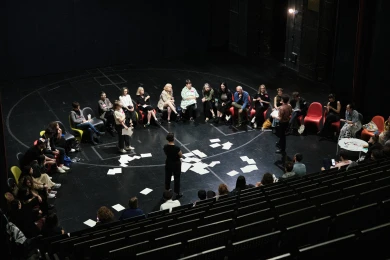
UP/ROOTING
11, 12, 13, 14, 15, 16 NOV 2025
Museo Reina Sofía and MACBA Museu d'Art Contemporani de Barcelona (MACBA) invite applications for the 2025 iteration of the School of Common Knowledge, which will take place from November 11th to 16th in Madrid and Barcelona.
The School of Common Knowledge (SCK) draws on the network, knowledge and experience of L’Internationale, a confederation of museums, art organizations and universities that strives to reimagine and practice internationalism, solidarity and communality within the cultural field. This year, the SCK program focuses on the contested and dynamic notions of rooting and uprooting in the framework of present —colonial, migrant, situated, and ecological— complexities.
Building on the legacy of the Glossary of Common Knowledge and the current European program Museum of the Commons, the SCK invites participants to reflect on the power of language to shape our understanding of art and society through a co-learning methodology. Its ambition is to be both nomadic and situated, looking at specific cultural and geopolitical situations while exploring their relations and interdependencies with the rest of the world.
In the current context fraught with war and genocide, the criminalization of migration and hyper-identitarianism, concepts such as un/belonging become unstable and in need of collective rethinking:
How can we reframe the sense and practice of belonging away from reductive nationalist paradigms or the violence of displacement? How to critically hold the entanglement of the colonial routes and the cultural roots we are part of? What do we do with the toxic legacies we inherit? And with the emancipatory genealogies and practices that we choose to align with? Can a renewed practice of belonging and coalition-making through affinity be part of a process of dis/identification? What geographies —cultural, artistic, political— do these practices of de/centering, up/rooting, un/belonging and dis/alignment designate?
Departing from these questions, the program consists of a series of visits to situated initiatives (including Museo Situado, Paisanaje and MACBA's Kitchen, to name a few), engagements with the exhibitions and projects on view (Project a Black Planet: The Art and Culture from Panafrica), a keynote lecture by Stefano Harney and Fred Moten, as well as daily reading and discussion gatherings, editorial harvest sessions, and conviviality moments.
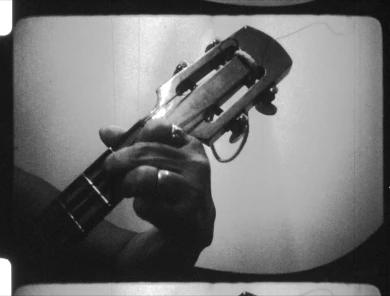
The Joaquim Jordà Residencies 2025
Friday, 7 November 2025 - 7pm
In this activity, the recipients of the 2024–2025 Joaquim Jordà Residencies call, María Aparicio (Argentina, 1992) and Andrés Jurado (Colombia, 1980), present respective projects related to their body of work in an open session in which to discover the creative interests of two of the most up-and-coming independent film-makers in Latin America today.
María Aparicio presents the working process behind her film De sol a sol (From Sun to Sun), along with a brief journey through the films prior to this project and her filmic searches in recent years. Aparicio synthesises the storyline of De sol a sol from the silhouettes of a group of men who appear between the stalks of a reedbed. Their knives glisten as the sun hits them, flashing and disappearing with their hand movements. Apprentices split the canes using no method; seasoned workers cut with skill. They are workers from a sugar mill in northern Argentina and are watched by Juan Bialet Massé, accompanied by Rosich, assistant and photographer. It is Argentina in 1904 and he is carrying out a mission assigned to him by his country’s government: to travel the Argentinian provinces, reporting on the state of the working classes.
Andrés Jurado, for his part, will look over his own work and the work of the La Vulcanizadora lab in this session. He will also open the archive stemming from the research process in the project Tonada, a journey through the succession of peace agreement betrayals in the history of Colombia. From the colonial era, understood in tumultuous terms, as a hurricane that keeps swirling, to the present day he traces the stories of people like Tacurrumbí, Benkos Biohó, Bateman and the many women and men who were betrayed by governments and oppressors. Tonada seeks to build a sound and film dialogue between the guerrilla disarmament of 1953 and the period following the peace agreement of 2016, invoking these and other events and confronting traumas of betrayal through a film composition devised to be sung. But what is sung? Some of these songs are heard and voices are shared in this presentation.
The Joaquim Jordà Residences programme for film-makers and artists was set in motion by the Museo Reina Sofía in 2022. The initiative comprises a grant for writing a film project rooted in experimentation and essay, as well as two subsequent residencies in FIDMarseille and Doclisboa, international film festivals devoted to exploring non-fictional film and new forms of audiovisual expression.
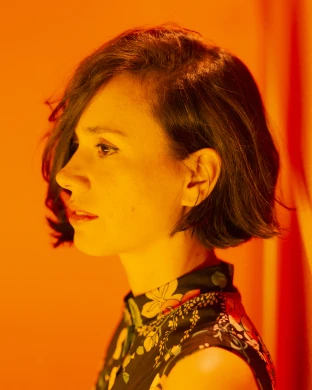
Ylia and Marta Pang
Thursday, 6 November - 8pm
The encounter between Spanish DJ and producer Ylia and visual artist Marta Pang is presented in the form of a premiere in the Museo Reina Sofía. Both artists converge from divergent trajectories to give form to a new project conceived specifically for this series, which aims to create new stage projects by setting out from the friction between artists and dialogue between disciplines.
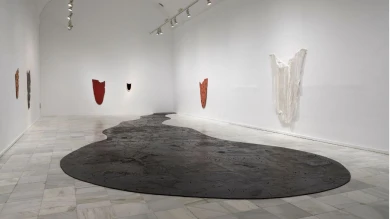
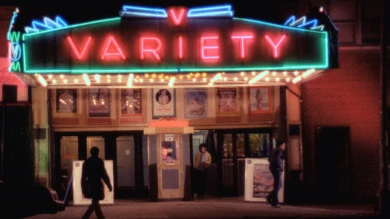
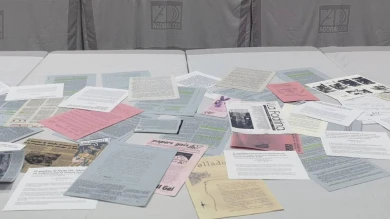
![Miguel Brieva, ilustración de la novela infantil Manuela y los Cakirukos (Reservoir Books, 2022) [izquierda] y Cibeles no conduzcas, 2023 [derecha]. Cortesía del artista](https://recursos.museoreinasofia.es/styles/small_landscape/public/Actividades/ecologias_del_deseo_utopico.jpg.webp)
![Ángel Alonso, Charbon [Carbón], 1964. Museo Reina Sofía](https://recursos.museoreinasofia.es/styles/small_landscape/public/Actividades/perspectivas_ecoambientales.jpg.webp)